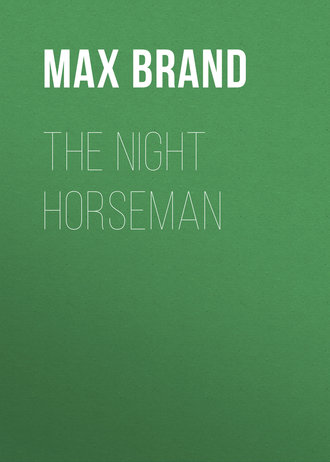
Макс Брэнд
The Night Horseman
She broke in rapidly: "This is all I can tell you: he is waiting for something which will never come. He has missed something from his life which will never come back into it. Then why should we discuss what it is that he has missed."
"To the critical mind," replied the doctor calmly, and he automatically adjusted his glasses closer to his eyes, "nothing is without significance."
"It is nearly dark!" she exclaimed hurriedly. "Let us ride on."
"First," he suggested, "I must tell you that before I left Elkhead I heard a hint of some remarkable story concerning a man and a horse and a dog. Is there anything—"
But it seemed that she did not hear. He heard a sharp, low exclamation which might have been addressed to her horse, and the next instant she was galloping swiftly down the slope. The doctor followed as fast as he could, jouncing in the saddle until he was quite out of breath.
CHAPTER IV
THE CHAIN
They had hardly passed the front door of the house when they were met by a tall man with dark hair and dark, deep-set eyes. He was tanned to the bronze of an Indian, and he might have been termed handsome had not his features been so deeply cut and roughly finished. His black hair was quite long, and as the wind from the opened door stirred it, there was a touch of wildness about the fellow that made the heart of Randall Byrne jump. When this man saw the girl his face lighted, briefly; when his glance fell on Byrne the light went out.
"Couldn't get the doc, Kate?" he asked.
"Not Doctor Hardin," she answered, "and I've brought Doctor Byrne instead."
The tall man allowed his gaze to drift leisurely from head to foot of Randall Byrne.
Then: "H'ware you, doc?" he said, and extended a big hand. It occurred to Byrne that all these men of the mountain-desert were big; there was something intensely irritating about their mere physical size; they threw him continually on the defensive and he found himself making apologies to himself and summing up personal merits. In this case there was more direct reason for his anger. It was patent that the man did not weight the strange doctor against any serious thoughts.
"And this," she was saying, "is Mr. Daniels. Buck, is there any change?"
"Nothin' much," answered Buck Daniels. "Come along towards evening and he said he was feeling kind of cold. So I wrapped him up in a rug. Then he sat some as usual, one hand inside of the other, looking steady at nothing. But a while ago he began getting sort of nervous."
"What did he do?"
"Nothing. I just felt he was getting excited. The way you know when your hoss is going to shy."
"Do you want to go to your room first, doctor, or will you go in to see him now?"
"Now," decided the doctor, and followed her down the hall and through a door.
The room reminded the doctor more of a New England interior than of the mountain-desert. There was a round rag rug on the floor with every imaginable colour woven into its texture, but blended with a rude design, reds towards the centre and blue-greys towards the edges. There were chairs upholstered in green which looked mouse-coloured where the high lights struck along the backs and the arms—shallow-seated chairs that made one's knees project foolishly high and far. Byrne saw a cabinet at one end of the room, filled with sea-shells and knicknacks, and above it was a memorial cross surrounded by a wreath inside a glass case. Most of the wall space thronged with engravings whose subjects ranged from Niagara Falls to Lady Hamilton. One entire end of the room was occupied by a painting of a neck and neck finish in a race, and the artist had conceived the blooded racers as creatures with tremendous round hips and mighty-muscled shoulders, while the legs tapered to a faun-like delicacy. These animals were spread-eagled in the most amazing fashion, their fore-hoofs reaching beyond their noses and their rear hoofs striking out beyond the tips of the tails. The jockey in the lead sat quite still, but he who was losing had his whip drawn and looked like an automatic doll—so pink were his cheeks. Beside the course, in attitudes of graceful ease, stood men in very tight trousers and very high stocks and ladies in dresses which pinched in at the waist and flowed out at the shoulders. They leaned upon canes or twirled parasols and they had their backs turned upon the racetrack as if they found their own negligent conversation far more exciting than the breathless, driving finish.
Under the terrific action and still more terrific quiescence of this picture lay the sick man, propped high on a couch and wrapped to the chest in a Navajo blanket.
"Dad," said Kate Cumberland, "Doctor Hardin was not in town. I've brought out Doctor Byrne, a newcomer."
The invalid turned his white head slowly towards them, and his shaggy brows lifted and fell slightly—a passing shadow of annoyance. It was a very stern face, and framed in the long, white hair it seemed surrounded by an atmosphere of Arctic chill. He was thin, terribly thin—not the leanness of Byrne, but a grim emaciation which exaggerated the size of a tall forehead and made his eyes supernally bright. It was in the first glance of those eyes that Byrne recognized the restlessness of which Kate had spoken; and he felt almost as if it were an inner fire which had burned and still was wasting the body of Joseph Cumberland. To the attentions of the doctor the old man submitted with patient self-control, and Byrne found a pulse feeble, rapid, but steady. There was no temperature. In fact, the heat of the body was a trifle sub-normal, considering that the heart was beating so rapidly.
Doctor Byrne started. Most of his work had been in laboratories, and the horror of death was not yet familiar, but old Joseph Cumberland was dying. It was not a matter of moment. Death might be a week or a month away, but die soon he inevitably must; for the doctor saw that the fire was still raging in the hollow breast of the cattleman, but there was no longer fuel to feed it.
He stared again, and more closely. Fire without fuel to feed it!
Doctor Byrne gave what seemed to be an infinitely muffled cry of exultation, so faint that it was hardly a whisper; then he leaned closer and pored over Joe Cumberland with a lighted eye. One might have thought that the doctor was gloating over the sick man.
Suddenly he straightened and began to pace up and down the room, muttering to himself. Kate Cumberland listened intently and she thought that what the man muttered so rapidly, over and over to himself, was: "Eureka! Eureka! I have found it!"
Found what? The triumph of mind over matter!
On that couch was a dead body. The flutter of that heart was not the strong beating of the normal organ; the hands were cold; even the body was chilled; yet the man lived.
Or, rather, his brain lived, and compelled the shattered and outworn body to comply with its will. Doctor Byrne turned and stared again at the face of Cumberland. He felt as if he understood, now, the look which was concentrated so brightly on the vacant air. It was illumined by a steady and desperate defiance, for the old man was denying his body to the grave.
The scene changed for Randall Byrne. The girl disappeared. The walls of the room were broken away. The eyes of the world looked in upon him and the wise men of the world kept pace with him up and down the room, shaking their heads and saying: "It is not possible!"
But the fact lay there to contradict them.
Prometheus stole fire from heaven and paid it back to an eternal death. The old cattleman was refusing his payment. It was no state of coma in which he lay; it was no prolonged trance. He was vitally, vividly alive; he was concentrating with a bitter and exhausting vigour day and night, and fighting a battle the more terrible because it was fought in silence, a battle in which he could receive no aid, no reinforcement, a battle in which he could not win, but in which he might delay defeat.
Ay, the wise men would smile and shake their heads when he presented this case to their consideration, but he would make his account so accurate and particular and so well witnessed that they would have to admit the truth of all he said. And science, which proclaimed that matter was indestructible and that the mind was matter and that the brain needed nourishment like any other muscle—science would have to hang the head and wonder!
The eyes of the girl brought him to halt in his pacing, and he stopped, confronting her. His excitement had transformed him. His nostrils were quivering, his eyes were pointed with light, his head was high, and he breathed fast. He was flushed as the Roman Conqueror. And his excitement tinged the girl, also, with colour.
She offered to take him to his room as soon as he wished to go. He was quite willing. He wanted to be alone, to think. But when he followed her she stopped him in the hall. Buck Daniels lumbered slowly after them in a clumsy attempt at sauntering.
"Well?" asked Kate Cumberland.
She had thrown a blue mantle over her shoulders when she entered the house, and the touch of boyish self-confidence which had been hers on the ride was gone. In its place there was something even more difficult for Randall Byrne to face. If there had been a garish brightness about her when he had first seen her, the brilliancy of a mirror playing in the sun against his feeble eyes, there was now a blending of pastel shades, for the hall was dimly illumined and the shadow tarnished her hair and her pallor was like cold stone; even her eyes were misted by fear. Yet a vital sense of her nearness swept upon Byrne, and he felt as if he were surrounded—by a danger.
"Opinions," said the doctor, "based on so summary an examination are necessarily inexact, yet the value of a first impression is not negligible. The best I can say is that there is probably no immediate danger, but Mr. Cumberland is seriously ill. Furthermore, it is not old age."
He would not say all he thought; it was not yet time.
She winced and clasped her hands tightly together. She was like a child about to be punished for a crime it has not committed, and it came vaguely to the doctor that he might have broached his ill tidings more gently.
He added: "I must have further opportunities for observance before I give a detailed opinion and suggest a treatment."
Her glance wandered past him and at once the heavy step of Buck Daniels approached.
"At least," she murmured, "I am glad that you are frank. I don't want to have anything kept from me, please. Buck, will you take the doctor up to his room?" She managed a faint smile. "This is an old-fashioned house, Doctor Byrne, but I hope we can make you fairly comfortable. You'll ask for whatever you need?"
The doctor bowed, and was told that they would dine in half an hour, then the girl went back towards the room in which Joe Cumberland lay. She walked slowly, with her head bent, and her posture seemed to Byrne the very picture of a burden-bearer. Then he followed Daniels up the stairs, led by the jingling of the spurs, great-rowelled spurs that might grip the side of a refractory horse like teeth.
A hall-light guided them, and from the hall Buck Daniels entered a room and fumbled above him until he had lighted a lamp which was suspended by two chains from the ceiling, a circular burner which cast a glow as keen as an electric globe. It brought out every detail of the old-fashioned room—the bare, painted floor; the bed, in itself a separate and important piece of architecture with its four tall posts, a relic of the times when beds were built, not simply made; and there was a chest of drawers with swelling, hospitable front, and a rectangular mirror above with its date in gilt paint on the upper edge. A rising wind shook the window and through some crack stirred the lace curtains; it was a very comfortable retreat, and the doctor became aware of aching muscles and a heavy brain when he glanced at the bed.
The same gust of wind which rattled the window-pane now pushed, as with invisible and ghostly hand, a door which opened on the side of the bedroom, and as it swung mysteriously and gradually wide the doctor found himself looking into an adjoining chamber. All he could see clearly was a corner on which struck the shaft of light from the lamp, and lying on the floor in that corner was something limp and brown. A snake, he surmised at first, but then he saw clearly that it was a chain of formidable proportions bolted against the wall at one end and terminating at the other in a huge steel collar. A chill started in the boots of the doctor and wriggled its uncomfortable way up to his head.
"Hell!" burst out Buck Daniels. "How'd that door get open?" He slammed it with violence. "She's been in there again, I guess," muttered the cowpuncher, as he stepped back, scowling.
"Who?" ventured the doctor.
Buck Daniels whirled on him.
"None of your—" he began hotly, but checked himself with choking suddenness and strode heavily from the room.
CHAPTER V
THE WAITING
The doctor removed his coat with absent-minded slowness, and all the time that he was removing the dust and the stains of travel, he kept narrowing the eye of his mind to visualise more clearly that cumbersome chain which lay on the floor of the adjoining room. Now, the doctor was not of a curious or gossipy nature, but if someone had offered to tell him the story of that chain for a thousand dollars, the doctor at that moment would have thought the price ridiculously small.
Then the doctor went down to the dinner table prepared to keep one eye upon Buck Daniels and the other upon Kate Cumberland. But if he expected to learn through conversation at the table he was grievously disappointed, for Buck Daniels ate with an eye to strict business that allowed no chatter, and the girl sat with a forced smile and an absent eye. Now and again Buck would glance up at her, watch her for an instant, and then turn his attention back to his plate with a sort of gloomy resolution; there were not half a dozen words exchanged from the beginning to the end of the meal.
After that they went in to the invalid. He lay in the same position, his skinny hands crossed upon his breast, and his shaggy brows were drawn so low that the eyes were buried in profound shadow. They took positions in a loose semi-circle, all pointing towards the sick man, and it reminded Byrne with grim force of a picture he had seen of three wolves waiting for the bull moose to sink in the snows: they, also, were waiting for a death. It seemed, indeed, as if death must have already come; at least it could not make him more moveless than he was. Against the dark wall his profile was etched by a sharp highlight which was brightest of all on his forehead and his nose; while the lower portion of the face was lost in comparative shadow.
So perfect and so detailed was the resemblance to death, indeed, that the lips in the shadow smiled—fixedly. It was not until Kate Cumberland shifted a lamp, throwing more light on her father, that Byrne saw that the smile was in reality a forcible compression of the lips. He understood, suddenly, that the silent man on the couch was struggling terribly against an hysteria of emotion. It brought beads of sweat out upon the doctor's tall forehead; for this perfect repose suggested an agony more awful than yells and groans and struggles. The silence was like acid; it burned without a flame. And Byrne knew, that moment, the quality of the thing which had wasted the rancher. It was this acid of grief or yearning which had eaten deep into him and was now close to his heart. The girl had said that for six months he had been failing. Six months! Six eternities of burning at the stake!
He lay silent, waiting; and his resignation meant that he knew death would come before that for which he waited. Silence, that was the key-note of the room. The girl was silent, her eyes dark with grief; yet they were not fixed upon her father. It came thrilling home to Byrne that her sorrow was not entirely for her dying parent, for she looked beyond him rather than at him. Was she, too, waiting? Was that what gave her the touch of sad gravity, the mystery like the mystery of distance?
And Buck Daniels. He, also, said nothing. He rolled cigarettes one after another with amazing dexterity and smoked them with half a dozen Titanic breaths. His was a single-track mind. He loved the girl, and he bore the sign of his love on his face. He wanted her desperately; it was a hunger like that of Tantalus, too keen to be ever satisfied. Yet, still more than he looked at the girl, he, also, stared into the distance. He, also, was waiting!
It was the deep suspense of Cumberland which made him so silently alert. He was as intensely alive as the receiver of a wireless apparatus; he gathered information from the empty air.
So that Byrne was hardly surprised, when, in the midst of that grim silence, the old man raised a rigid forefinger of warning. Kate and Daniels stiffened in their chairs and Byrne felt his flesh creep. Of course it was nothing. The wind, which had shaken the house with several strong gusts before dinner, had now grown stronger and blew with steadily increasing violence; perhaps the sad old man had been attracted by the mournful chorus and imagined some sound he knew within it.
But now once more the finger was raised, the arm extended, shaking violently, and Joe Cumberland turned upon them a glance which flashed with a delirious and unhealthy joy.
"Listen!" he cried. "Again!"
"What?" asked Kate.
"I hear them, I tell you."
Her lips blanched, and parted to speak, but she checked the impulse and looked swiftly about the room with what seemed to Byrne an appeal for help. As for Buck Daniels, he changed from a dark bronze to an unhealthy yellow; fear, plain and grimly unmistakable, was in his face. Then he strode to the window and threw it open with a crash. The wind leaped in and tossed the flame in the throat of the chimney, so that great shadows waved suddenly through the room, and made the chairs seem afloat. Even the people were suddenly unreal. And the rush of the storm gave Byrne an eerie sensation of being blown through infinite space. For a moment there was only the sound of the gale and the flapping of a loose picture against the wall, and the rattling of a newspaper. Then he heard it.
First it was a single note which he could not place. It was music, and yet it was discordant, and it had the effect of a blast of icy wind.
Once he had been in Egypt and had stood in a corridor of Cheops' pyramid. The torch had been blown out in the hand of his guide. From somewhere in the black depths before them came a laugh, made unhuman by echoes. And Byrne had visioned the mummied dead pushing back the granite lids of their sarcophagi and sitting upright.
But that was nothing compared with this. Not half so wild or strange.
He listened again, breathless, with the sharp prickling running up and down his spine. It was the honking of the wild geese, flying north. And out of the sound he builded a picture of the grey triangle cleaving through the cold upper sky, sent on a mission no man could understand.
"Was I right? Was I right?" shrilled the invalid, and when Byrne turned towards him, he saw the old man sitting erect, with an expression of wild triumph. There came an indescribable cry from the girl, and a deep throated curse from Buck Daniels as he slammed down the window.
With the chill blast shut off and the flame burning steadily once more in the lamp, a great silence besieged the room, with a note of expectancy in it. Byrne was conscious of being warm, too warm. It was close in the room, and he was weighted down. It was as if another presence had stepped into the room and stood invisible. He felt it with unspeakable keenness, as when one knows certainly the thoughts which pass in the mind of another. And, more than that, he knew that the others in the room felt what he felt. In the waiting silence he saw that the old man lay on his couch with eyes of fire and gaping lips, as if he drank the wine of his joyous expectancy. And big Buck Daniels stood with his hand on the sash of the window, frozen there, his eyes bulging, his heart thundering in his throat. And Kate Cumberland sat with her eyes closed, as she had closed them when the wind first rushed upon her, and she still smiled as she had smiled then. And to Byrne, more terrible than the joy of Joseph Cumberland or the dread of Buck Daniels was the smile and the closed eyes of the girl.
But the silence held and the fifth presence was in the room, and not one of them dared speak.






